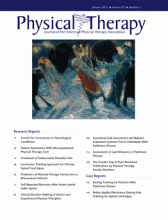Abstract
Background Evidence from a recent randomized controlled trial indicated that supervised exercises (SE) were more effective than radial extracorporeal shock-wave therapy (rESWT) for the treatment of subacromial shoulder pain in the short to medium term. Little knowledge exists about the long-term results of rESWT for subacromial pain.
Objective The aim of this study was to evaluate the results of rESWT and SE provided to patients with subacromial shoulder pain after 1 year.
Design This was a single-blind randomized controlled trial.
Setting The study was conducted in the outpatient clinic of the Physical Medicine and Rehabilitation Department at Oslo University Hospital, Ullevaal, Norway.
Patients One hundred four patients with subacromial shoulder pain lasting at least 3 months participated. Patients were randomly assigned to either an rESWT group (n=52) or an SE group (n=52).
Intervention The rESWT intervention consisted of one session weekly for 4 to 6 weeks. The SE intervention consisted of two 45-minute sessions per week for up to 12 weeks.
Measurements The primary outcome measure was the Shoulder Pain and Disability Index. Secondary outcome measures were questions regarding pain and function and work status.
Results After 1 year, an intention-to-treat analysis showed no significant differences between the 2 groups for the primary outcome measure (−7.6 points, 95% confidence interval=−16.6 to 0.5) and pain, function, and medication use. Twenty-nine participants (60%) in the SE group versus 24 participants (52%) in the rESWT group were categorized as clinically improved. Thirty-eight participants in the SE group were at work compared with 30 participants in the rESWT group (odds ratio=1.1, 95% confidence interval=1.0 to 1.2). Fewer patients in the SE group had received additional treatments between 18 weeks and 1 year.
Limitations The lack of a placebo control group, the lack of a cost-benefit analysis, and the small sample size were limitations of the study.
Conclusion No significant difference was found between the SE and rESWT groups at the 1-year follow-up. More participants in the SE group had returned to work.
Footnotes
All authors provided concept/idea/research design and consultation (including review of manuscript before submission). Ms Engebretsen, Dr Grotle, and Dr Brox provided writing. Ms Engebretsen provided data collection. Ms Engebretsen, Dr Grotle, Dr Ekeberg, and Dr Brox provided data analysis. Ms Engebretsen, Dr Grotle, Dr Bautz-Holter, and Dr Juel provided project management. Ms Engebretsen, Dr Bautz-Holter, Dr Ekeberg, and Dr Juel provided participants. Ms Engebretsen, Dr Bautz-Holter, and Dr Juel provided facilities/equipment and institutional liaisons.
The study protocol was approved by the Ethics Committee for Medical Research Region 1 of Norway.
The study was funded by Health Region East, Norway.
ClinicalTrials.gov registration number: NCT00653081.
- Received October 14, 2009.
- Accepted August 27, 2010.












